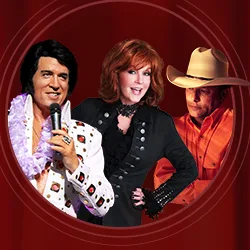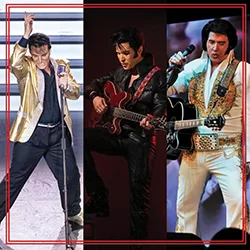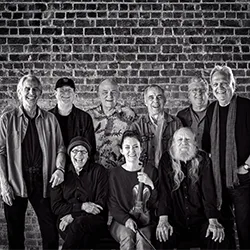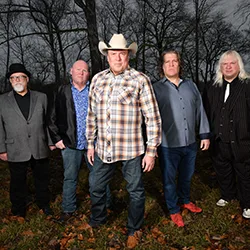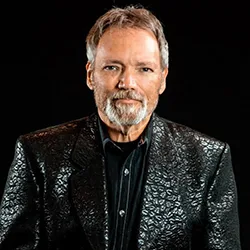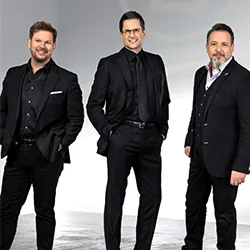

Kentucky Headhunters & The Outlaws
-
DateMay 11, 2024
-
Event Starts7:30pm
-
Doors Open6:30pm
-
AvailabilityPast Event
-
LocationBlue Gate PAC
760 S Van Buren St
Shipshewana, IN 46565
-
Seating ChartView Seating Chart (If you are paying with a gift card, you must call to purchase tickets 260.768.4725)
May 11, 2024
Saturday @ 7:30pm
Event Details
Kentucky Headhunters
The Kentucky Headhunters created a hybrid of honky tonk, blues, and Southern rock that appealed to fans of both rock and country music. The origins of the Kentucky Headhunters lie in 1968, when Fredand Richard Young began playing together with their cousins Greg Martin and Anthony Kenney at the Youngs' grandmother's house. Mark Orr also later joined them. The first incarnation of the band was called the Itchy Brothers, and the group played together informally for over a decade. After about 13 years, the bandmembers began launching separate careers: Richard Young went off to write songs for Acuff-Rose, while Fred Young began touring with country beauty Sylvia. Martin became a member of Ronnie McDowell's band, while Kenney dropped out of music. In 1985, Martin decided to reassemble the Itchy Brothers. When Kenney declined to rejoin the group, Martin remembered Doug Phelps, whom he had met while on tour with McDowell. Phelps joined the new project, which was named the Kentucky Headhunters. Besides Martin and Phelps, the band also included the Young brothers and Doug's brother Ricky Lee Phelps.The Headhunters started playing twice monthly on The Chitlin' Show, a program on Munfordville, Kentucky radio station WLOC. From these 90-minute performances, the Headhunters built up a following. They sent an eight-song demo to Mercury, and soon after, the label signed the group. The original demo tape was remixed, and became the basis of the band's first album, 1989's Pickin' on Nashville, which received overwhelmingly positive reviews upon its release and quickly became a hit. "Dumas Walker" reached number 15 in the spring of 1990, followed by the group's biggest hit, the number six "Oh, Lonesome Me." In 1991, the Headhunters released their second effort, Electric Barnyard. The album received mixed reviews, couldn't muster a single, and sold weakly. In summer 1992, the Phelps brothers left the group to form Brothers Phelps, a more traditional country group.
The remaining Headhunters brought ex-Itchy Brothers Anthony Kenney and Mark Orr to the group, and the rehashed lineup released Rave On! in 1993. The album marked a progression toward bluesy Southern rock, which came to fruition later that same year with That'll Work, a collaboration with former Chuck Berry pianist Johnnie Johnson. In 1996, Doug returned on lead vocals, and a year later the band issued Stompin' Grounds. Songs from the Grass String Ranch followed in 2000, and Soul appeared in spring 2003. Big Boss Man was released in 2005 and Flying Under the Radar in 2006, both from CBUJ Entertainment. Dixie Lullabies, the group's 12th album, and first studio recording of new original material since 2003, appeared from Red Dirt Records in 2011. In 2015, the Headhunters released another collaborative album with Johnnie Johnson, Meet Me in Bluesland, drawn from unissued sessions recorded in 2003, two years before Johnson's death. Just before entering the studio to record their next studio LP, bandmates Richard and Fred Young lost their father. That loss, combined with the excitement of the band's first European tour, added an emotional poignancy to On Safari, which was released in 2016.
The Kentucky Headhunters, declared "the great American rock 'n' roll band" by Billboard magazine, began their professional journey in 1968 when brothers Fred and Richard Young and cousins Greg Martin and Anthony Kenney formed the Southern blues-rock band Itchy Brother. The band morphed into The Kentucky Headhunters in 1986. Their first album, 1989's Pickin' On Nashville, was released by Mercury Records and surprised the world, becoming a bona fide hit, selling over two million copies. The album won a Grammy Award, three Country Music Awards, an American Music Award and an Academy Of Country Music Award. It spawned four consecutive Top 40 Country hits. Currently, the band is made up of Richard Young, Fred Young, Greg Martin and Doug Phelps.
The Outlaws
For The Outlaws, it's always been about the music. For more than 40 years, the Southern Rock legends celebrated triumphs and endured tragedies to remain one of the most influential and best-loved bands of the genre. Today, The Outlaws have returned with new music, new focus, and an uncompromising new mission: It's about a band of brothers bound together by history, harmony, and the road. It's about a group that respects its own legacy while refusing to be defined by it's past. But most of all, it's about pride.It's About Pride was also the title of the band's acclaimed 2012 album, universally hailed as their victorious comeback. "Because The Outlaws had been out of the public eye for so long, it was almost like starting over," explains founding singer / songwriter / guitarist Henry Paul. "But because of the band's history, we dig deeper, write better, perform stronger. Everything we do is to reinforce the notion that The Outlaws still matter, and that Southern Rock will always matter. It's a message we're proud to bring into the 21st century."
History lesson: Formed in Tampa in 1972, The Outlaws - known for their triple-guitar rock attack and three-part country harmonies - became one of the first acts signed by Clive Davis (at the urging of Ronnie Van Zant) to his then-fledgling Arista Records. The band's first three albums The Outlaws, Lady In Waiting, and Hurry Sundown - featuring such rock radio favorites as 'There Goes Another Love Song,' 'Green Grass & High Tides,' 'Knoxville Girl,' and 'Freeborn Man' - would become worldwide gold and platinum landmarks of the Southern Rock era. Known as 'The Florida Guitar Army' by their fans, The Outlaws earned a formidable reputation as an incendiary live act touring with friends The Allman Brothers, Lynyrd Skynyrd, The Marshall Tucker Band and The Charlie Daniels Band, as well as The Doobie Brothers, The Who, Eagles and The Rolling Stones. Henry Paul left after the group's third album to form The Henry Paul Band for Atlantic Records, and later co-founded the multi-Platinum country trio BlackHawk. Over the next 20+ years, The Outlaws would experience rampant personnel changes, tonal missteps, ill-fated reunions, and bitter trademark battles that left fans, not to mention Paul, frustrated and saddened. And with the tragic deaths of co-founding members Frank O'Keefe and Billy Jones in 1995 and songwriter/vocalist/lead guitarist Hughie Thomasson in 2007, it was feared that The Outlaws' trail had come to an end.
When Henry Paul took leadership of the band in 2008, he firmly put The Outlaws back on a path both trusted and celebrated by longtime fans. "Audiences discovered that The Outlaws have something to say that is as engaging as when we began," says Paul, "which is why every night when we perform, we give nothing less than everything we've got." Along with founding member Paul, the band features several of Southern Rock's most respected players: Keyboardist/vocalist Dave Robbins is a co-founding member of BlackHawk and has written hits for artists that include Restless Heart, Kenny Rogers and Eric Clapton. Longtime bassist/vocalist Randy Threet has performed with Trisha Yearwood, Pam Tillis, and BlackHawk, and is familiar to audiences from USA Network's 'Nashville Star.' Lead guitarist Jimmy Dormire has played to millions with Confederate Railroad, Colonel Bruce Hampton, and The Luke Wheeler Band on the TV series Nashville. Drummer Michael Grando - who replaces the band's retired / beloved co-founder Monte Yoho - has powered the beat for artists that include Joe Diffie, Jason Aldean, and Chris Knight. Vocalist / co-guitarist Jeff Aulich brings new fire to the band's harmony arrangements and six-string pyrotechnics. The Outlaws have not only re-emerged as what fans now call 'Southern Rock's Last Band Standing,' but as a dedicated band of brothers who still write, play and perform with the skill, grit, and fire of acts a fraction of their age. "I want the fans to see the band's growth and recognize the quality of the music," Henry says. "We're focused on where we come from, where we're headed and how much fun we're still having on the ride."
As live performers, the band burns hotter than ever. "The Outlaws helped define Southern Rock for me and for generations of fans," wrote music journalist Bill Robinson in The Huffington Post. "Seeing them onstage with The Charlie Daniels Band, The Marshall Tucker Band, The Allman Brothers, Lynyrd Skynyrd or countless others was, for a long time, one of the best experiences I could have. And so it was again when I saw The Outlaws play recently." The band's concerts - vividly captured in their 2016 double album Legacy Live - are blazing 2+ hour tributes to the band's rich history and fiery rebirth. Classic tracks and fan favorites from the first three albums - as well as The Henry Paul Band's definitive 'Grey Ghost' - share the spotlight with songs from It's About Pride and 2020's acclaimed Dixie Highway that have been enthusiastically embraced by audiences. "I think our new material goes back to those three classic Outlaws albums, when the band was proud of its influences from country, blues and jazz," says Paul. "Plus, Jimmy and Jeff have honored and maybe even stepped up the legacy of 'The Guitar Army'. Our goal is to unite the fans and bring the band back into the light. It's about finishing what we started." For Henry, Dave, Randy, Jimmy, Michael, and Jeff, it's also about a band of brothers who love playing their own brand of rock, and who 40+ years ago first got the chance to share it with the world.
For The Outlaws, it's still about the music. And now more than ever, it's about pride.
Plan Your Visit:▼
Parking: Free parking is available at the venue. Please have patience and be respectful when leaving our parking lots after the show.
Ticket Office: For ticket sales and assistance with ticket orders, please visit our box office or call 260-768-4725. Box Office hours are Monday thru Saturday, 10am to 7pm. All ticket sales are final and non-refundable, no exception.
Tickets: Your phone is your ticket. Make sure you have downloaded your ticket before arriving at the venue to present at ticket check. Will Call tickets can be picked up at the box office window, and you must present a photo ID. If you need your tickets printed for any reason, visit the venue box office prior to entering ticket check. Tickets that include a dining package will need to be printed prior to visiting the restaurant since they serve as your dining voucher.
Rain or Shine Events: All events are rain or shine. In the event of hazardous weather during an event, please follow the safety directions given by venue staff and displayed on digital screens.
Bag Policy: For safety and efficiency, we recommend entering without a purse or bag at our venues. If essential items are needed, we encourage guests to bring them in a small, clear purse. All non-clear purses will be searched, and this will be enforced upon entry at our Performing Arts Center. Diaper Bags for families with small children and bags with required medical items are permitted. No oversized purses, tote or duffel bags, or backpacks of any type will be allowed.
Prohibited Items: Please review the prohibited items list before you come to an event. This list can be found on our FAQ page.
Concessions: Refreshments are available for purchase within the venue. No outside food, candy, or beverages are allowed.
Bar Service: We do have beer and wine service available at most of our PAC concerts. Hours of service vary, depending on show schedule, but the bar is typically open for at least 90 minutes once doors are open.
No Smoking: Smoking and vaping are strictly prohibited inside the venue.
Safety and Security Policies: All members of your party must have a ticket to enter the venue. All individuals entering the facility are required to go through a security screening which includes metal detection and checking bags for prohibited items. These security screenings may vary on some events, so please refer to your "Know Before You Go" email to plan your visit accordingly. Re-entry is not permitted without a ticket. For a complete list of prohibited items and venue policies, visit our FAQ page.
Accessibility: For complete information on our services, please visit the Accessibility section of our FAQ page.
Dining Packages: Buffet dining at our Blue Gate Restaurant can be added to any ticket price for your convenience. Price would include meal but not gratuity. To ensure guests have time to dine, we suggest arriving no later than 2 hours prior to show time, in case the restaurant is on a wait.
Hotel Reservations: If you need hotel accommodations, consider staying at our Blue Gate Garden Inn – adjacent to the Performing Arts Center! For more information and to check availability, visit https://www.bluegategardeninn.com/ or call 260.768.4725.
For more information, simply visit our FAQ page.
Ticket Office: For ticket sales and assistance with ticket orders, please visit our box office or call 260-768-4725. Box Office hours are Monday thru Saturday, 10am to 7pm. All ticket sales are final and non-refundable, no exception.
Tickets: Your phone is your ticket. Make sure you have downloaded your ticket before arriving at the venue to present at ticket check. Will Call tickets can be picked up at the box office window, and you must present a photo ID. If you need your tickets printed for any reason, visit the venue box office prior to entering ticket check. Tickets that include a dining package will need to be printed prior to visiting the restaurant since they serve as your dining voucher.
Rain or Shine Events: All events are rain or shine. In the event of hazardous weather during an event, please follow the safety directions given by venue staff and displayed on digital screens.
Bag Policy: For safety and efficiency, we recommend entering without a purse or bag at our venues. If essential items are needed, we encourage guests to bring them in a small, clear purse. All non-clear purses will be searched, and this will be enforced upon entry at our Performing Arts Center. Diaper Bags for families with small children and bags with required medical items are permitted. No oversized purses, tote or duffel bags, or backpacks of any type will be allowed.
Prohibited Items: Please review the prohibited items list before you come to an event. This list can be found on our FAQ page.
Concessions: Refreshments are available for purchase within the venue. No outside food, candy, or beverages are allowed.
Bar Service: We do have beer and wine service available at most of our PAC concerts. Hours of service vary, depending on show schedule, but the bar is typically open for at least 90 minutes once doors are open.
No Smoking: Smoking and vaping are strictly prohibited inside the venue.
Safety and Security Policies: All members of your party must have a ticket to enter the venue. All individuals entering the facility are required to go through a security screening which includes metal detection and checking bags for prohibited items. These security screenings may vary on some events, so please refer to your "Know Before You Go" email to plan your visit accordingly. Re-entry is not permitted without a ticket. For a complete list of prohibited items and venue policies, visit our FAQ page.
Accessibility: For complete information on our services, please visit the Accessibility section of our FAQ page.
Dining Packages: Buffet dining at our Blue Gate Restaurant can be added to any ticket price for your convenience. Price would include meal but not gratuity. To ensure guests have time to dine, we suggest arriving no later than 2 hours prior to show time, in case the restaurant is on a wait.
Hotel Reservations: If you need hotel accommodations, consider staying at our Blue Gate Garden Inn – adjacent to the Performing Arts Center! For more information and to check availability, visit https://www.bluegategardeninn.com/ or call 260.768.4725.
For more information, simply visit our FAQ page.
More Shows You'll Like:
